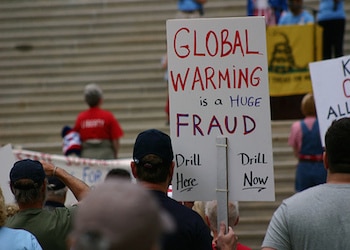Before members of Congress departed Washington, D.C. for their month-long August recess, senators attempted one final vote on a resolution that did nothing more than state that the Senate accepts the science on climate change. Noted science-denying Republican James Inhofe blocked the resolution, which required a unanimous vote by Senators in order to pass.
Thus, the resolution failed, but not before Democratic Senator Sheldon Whitehouse issued a stirring rebuttal to Inhofe’s claims of climate change being a hoax:
While a few people like Senator Whitehouse are fighting the good fight from inside the system itself, they still need help from the outside in order to hold climate change deniers and environmental polluters accountable. The NRDC Action Fund has stepped in to back them up this summer.
While members of the U.S. House of Representatives and Senate are out campaigning during their recess, the NRDC Action Fund has launched a “Dirty Denier$” campaign that will feature a different member of Congress every day.
The featured member will be someone who either denies climate change, consistently votes against environmental issues, or someone who is in the pocket of the dirty energy industry.
According to an NRDC Action Fund press release:
The “Daily Dirty Denier$” campaign is focused on bringing attention to these member Congress while they are home and trying to convince voters they have their best interests in mind. We will expose:
House members who have now voted almost 200 times in just this Congress to weaken or eliminate environmental protections;
How outside polluter money is being used to support #DirtyDenier$;
Why polluters lost in 2012 and why they will lose again in 2014; and
Support for climate action specifically among the rising American electorate.
In the first three days of the campaign, NRDC Action Fund profiled three Republicans: Sen. Mitch McConnell, Rep. Tim Walberg, and Sen. Marco Rubio. All three of these men have taken substantial amounts of cash from the dirty energy industry, and they have all questioned the science behind anthropogenic climate change.
The goal of the Dirty Denier$ campaign is to educate American voters on climate and energy issues ahead of the 2014 midterm elections.
As more and more time passes, these foes of science are allowing irreversible damage to our environment and the global climate, and the only way to bring about meaningful change is to call out industry-funded politicians for their crimes against nature.
Subscribe to our newsletter
Stay up to date with DeSmog news and alerts






